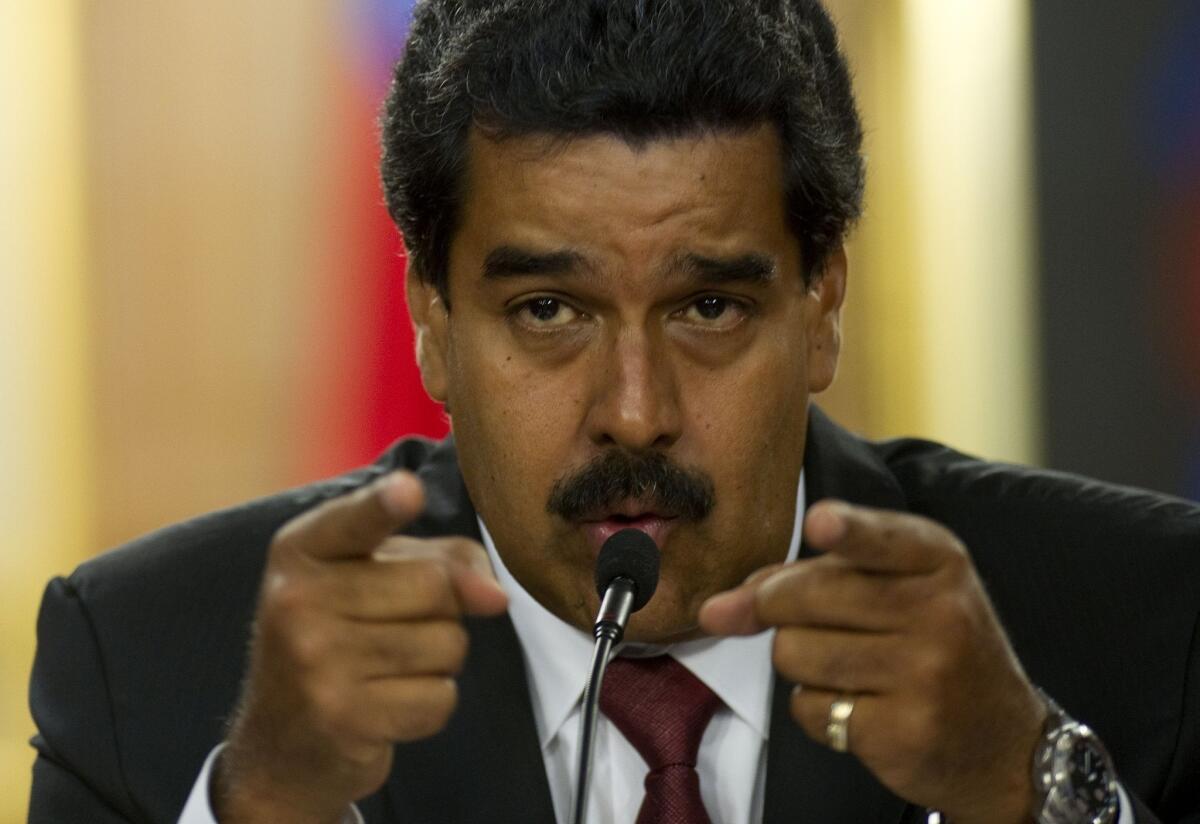Winners and losers in Venezuela’s presidential election

- Share via
Venezuela’s National Electoral Council declared Nicolas Maduro, the handpicked successor of the late President Hugo Chavez, the winner in the presidential election Sunday. But it was a victory in a compromised system that tilted the table in his favor.
FOR THE RECORD:
Venezuela: The biographical information in an April 19 Op-Ed on the Venezuelan election misreported the name of an L.A. organization. It is the Pacific Council on International Policy, not the Pacific Council on International Affairs. —
Now Maduro must deal with an economy that is a shambles. He has no clear mandate and lacks legitimacy in the eyes of nearly half the voters.
The numbers are telling. In the October 2012 election, Chavez won by more than 10 percentage points. If the Electoral Council figures are accurate, Maduro’s margin was 50.7% to 49%. He got just 230,000 more votes than Henrique Capriles, the opposition candidate.
Capriles demanded a recount, citing more than 3,200 irregularities. Maduro initially agreed and then changed his mind. He was quickly certified as the winner. Protests, charges of conspiracy and violence followed, resulting in eight deaths.
So who really won and who lost on Sunday?
Losers
Nicolas Maduro. Maduro let a double-digit lead in the polls slide out of his grasp, receiving 686,000 fewer votes than Chavez had in October 2012. Capriles increased his vote by almost exactly the same number. Maduro lacked the charisma, communications skills and magnetism of Chavez. He came across as a substitute trying to channel Chavez. Assembly President Diosdado Cabello, Maduro’s rival within the government, is calling for “profound self-criticism.”
Hugo Chavez. His dying wish was for his supporters to vote for Maduro. Nearly 700,000 voters ignored his instruction. Inflation forced the devaluing of the currency by 30% in February. The resulting price increases cost Maduro dearly. Chavez spent so much government money on the October election that he left Maduro with empty coffers in April.
National Electoral Council. The Chavista-controlled Electoral Council ensured that the rules applied only to candidate Capriles. He got four minutes each day on national television. Maduro spent hours on TV inaugurating government projects in thinly disguised campaign events. Although all campaigning was required to end on April 11, the council raised no objections when every TV and radio station carried a Maduro political speech on April 14, election day. In previous elections, the results were released quickly because the vote is electronic. On Sunday, the council held the results for hours, raising suspicion of fraud. The council also refused to invite international observers to watch the proceedings. Had they done so, the observers might well have validated Maduro’s victory.
Pundits and politicians. Many interpreted Chavismo as poor people striving for political and economic inclusion. They saw the opposition as the wealthy, the white and the powerful. That distorted vision was upended by the opposition’s 49% share of the popular vote. Those 7.3 million votes span the social classes of the country.
The jury’s still out
United States. The U.S. lacks leverage to affect the actions of the Venezuelan government. By not responding aggressively to Maduro’s campaign charges of conspiracy, sabotage and assassination attempts, it avoided becoming a foil for the candidate. The Obama administration is carefully and deliberately calling for a “credible and transparent process” to “reassure the Venezuelan people of the [election] results.” Meanwhile as production of U.S. and Canadian oil has increased, Venezuelan oil has become increasingly irrelevant for the United States.
China and Brazil. These two nations supported Chavez, and now they support Maduro. They believed that Chavez’s Socialist Party was the natural party of power in Venezuela and put all their eggs in that basket. This paid off during the 14 years of Chavez’s presidency with huge increases in Brazilian and Chinese exports to Venezuela and in Chinese access to Venezuelan oil. Now China and Brazil may wish to reconsider their policies.
Winners
Cuba. As far as the Cubans are concerned, what’s important is keeping free Venezuelan oil flowing to Cuba. Maduro’s victory, however tenuous, assures that, at least for now. A UC San Diego colleague who just returned from Havana reports that Cubans — from taxi drivers to government officials — heaved a collective sigh of relief Sunday night. They dodged a bullet.
Venezuelan opposition. The opposition coalition surprised itself. Even though its candidate lost, it won. A leader is in place. The opposition is well organized. Its factions buried their internal differences. The call for a recount and the ham-fisted responses by the government will keep opposition forces energized. Although it may be premature to assume that the opposition is on the way up and Chavismo is in decline, the opposition has internalized an important lesson: Elections are won not in Washington or at the International Court of Justice but in Venezuela.
Henrique Capriles. In response to the election protests, the Chavista leaders and their bully boys have displayed an essential thuggishness in the streets and in the National Assembly. There is great potential for things to go from bad to worse as Maduro and his team try to hang on to power but without the savvy and political instincts of the departed Chavez. Capriles has called for his supporters to “take a break” and avoid violence. He looks like the statesman, while Maduro asks himself, “What would Hugo do?”
Charles Shapiro, president of the Institute of the Americas at UC San Diego, was U.S. ambassador to Venezuela from 2002-04. He will speak about Venezuela on Friday at the Pacific Council on International Policy in Los Angeles. @ioa_shapiro.
More to Read
A cure for the common opinion
Get thought-provoking perspectives with our weekly newsletter.
You may occasionally receive promotional content from the Los Angeles Times.






